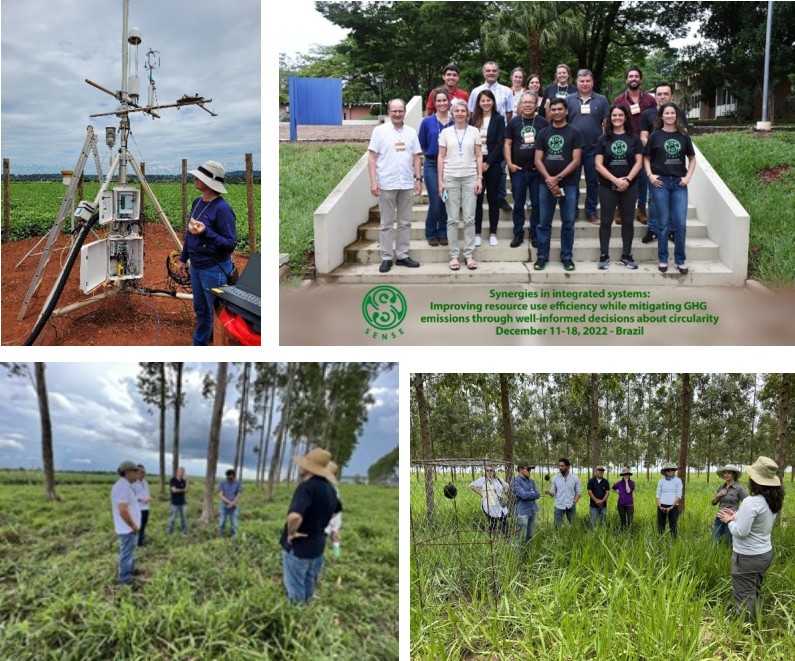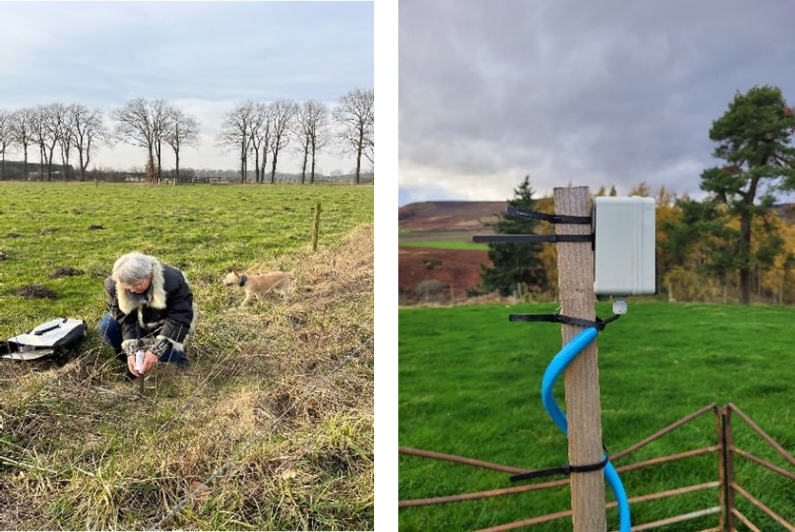Challenge
Specialization, intensification and spatial separation of crop, livestock and forestry production systems have contributed to climate change and biodiversity loss. Integrated crop-livestock-forestry systems offer multiple opportunities to reduce the environmental impact of agricultural production systems. Circular systems have been proposed to increase resource use efficiency, particularly of scarce nutrients, in a more sustainable way than conventional non-integrated systems. Therefore, bringing in circularity should contribute to minimize the environmental footprint of agriculture. A clear picture of potential synergies and trade-offs is required before prioritizing solutions.
Approach
SENSE will develop a matrix of indicators for effective quantification of the status of circularity within various integrated system case studies in four European countries (Germany, Italy, the Netherlands, and UK) and three South American countries (Argentina, Brazil and Uruguay). Contrasting scenarios of carbon, nutrients, water, and biomass flows will be simulated in the case studies through the application of process-based models such as manure-DNDC. This analysis will return the predictions trajectories at farm level to redesign systems towards more complete local circularity within crop-livestock-forestry integrated systems. SENSE will compare the circularity scenarios according to their potential for mitigating greenhouse gases (GHG) emissions. Further, the resilience of farm systems under climate change will be compared for the scenarios using a probabilistic risk analysis approach.
At farm level, SENSE will evaluate their side effects on other societal goals based on multidimensional sustainability assessment tools. SENSE will demonstrate a novel solution for improved land management systems, building knowledge through the linkage between sensors and High-Performance Computing (HPC) based data analysis, supported by modelling and visualization to meet farmers information needs to attain net-zero GHG emissions. SENSE will test a novel digital Monitoring, Reporting and Verification (MVR) system developed by James Hutton Institute and its application in quantifying and mitigating GHG emissions. SENSE will compare and discuss our cases, including with the participating farmers, at different levels of detail, through both circularity and ecological functioning indicators to discover general lessons for enhancing circularity at the farm level.
SENSE will contribute to the European Farm to Fork Strategy and to crosscutting actions of the European Circular Economy Action Plan. Circularity is considered a prerequisite for climate neutrality but bears potentially negative outcomes for other grand societal challenges. Moreover, SENSE will provide guidance for informed circularity decisions at farm level that consider the trade-offs with other sustainability goals. Translated into policy briefs, this information will help to design an enabling environment that effectively supports farmers to enhance circularity in their farming systems. The use of information from individual farms and the participation of farmers at several levels and different points during the implementation of the activities is key for the outcome of the project.
Initial outcomes: The SENSE project focuses on evaluating and enhancing circularity in crop-livestock-forestry integrated systems in Europe and South America. The project aims to promote circular agricultural practices that benefit farmers, communities, and the environment.
Field research conducted in Brazil: Field research conducted in Brazil: To understand the degree of integration between crop, livestock, and forestry systems, we conducted field research on three case studies in Brazil. Historic data from each case study is currently being compiled to establish a database. Additionally, a half-yearly meeting was organized in Brazil from 12-16 December 2022 to gain familiarity with the case studies. During this visit, we visited the three case studies and collected data that is depicted in the pictures.

Picture 1 to 4 from left to right:
- Eddy covariance system installed at the case study BR1 (Goiás, Brazil)
- SENSE half yearly meeting at the headquarters of Embrapa Rice & Beans (Goiás, Brazil)
- Visit to case study BR2 (Mato Grosso, Brazil)
- Visit to case study BR3 (Bahia, Brazil)
Circularity matrix developed to perform the circularity baseline assessment: To support robust decision-making for integrated production systems, we developed a circularity matrix that includes a list of circularity indicators to quantify the current circularity performance of the case studies in SENSE. This comprehensive Monitoring Framework can predict trajectories at the farm level to facilitate the redesign of systems towards greater local circularity in crop-livestock-forestry integrated systems. We are currently using the circularity matrix to collect data from each case study to perform the ongoing circularity baseline assessment.
Sensor networks deployed for data-driven assessment: As part of the SENSE project, we deployed several sensors in selected case studies to collect real-time data. By leveraging data-driven integrated systems, farmers can better understand and harness the interactions between the different components of a system, while shedding light on the essential relationships between soil, plants, trees, and livestock.

Figure 5 to 6 from left to right:
- Soil moisture and temperature sensor at the case study UK1 (Glensaugh farm, Scotland, UK)
- Sensor deployment at the case study NL2 (Noord-Brabant, the Netherlands)
Holistic sustainability assessment: We are currently conducting a multidimensional assessment utilizing the SMART tool (Sustainability Assessments in the Food and Agriculture Sector). This holistic sustainability analysis aims to assess the sustainability of management practices in farming systems.
We expect that the results of the SENSE project will aid in the advancement of sustainable agricultural techniques on a global scale, which will have positive impacts on farmers, communities, and the environment.
Papers
The work conducted in this project resulted in the following paper:
Oliveira, D.M. da S., Tavares, R.L.M., Loss, A., Madari, B.E., Cerri, C.E.P., Alves, B.J.R., Pereira, M.G., Cherubin, M.R., 2023. Climate-smart agriculture and soil C sequestration in Brazilian Cerrado: a systematic review. Rev. Bras. Ciênc. Solo 47. https://doi.org/10.36783/18069657rbcs20220055
Coordinated by
Dr Jagadeesh Yeluripati - The James Hutton Institute (JHI), United Kingdom
Partners
- UNITED KINGDOM: Centre for Ecology and Hydrology (CEH) and- University of Bristol (UOB)
- THE NETHERLANDS: Stichting Wageningen Research (WUR)
- GERMANY: University of Hohenheim (UHOH) and Demeter e.V.
- ITALY: Consiglio per la ricerca in agricoltura e l’analisi dell’economia agrarian (CREA)
- BRAZIL: Brazilian Agricultural Research Corporation (Embrapa)
- ARGENTNIA: National Institute of Agropecuarian Technology (INTA)
- URUGUAY: Instituto Nacional de Investigación Agropecuaria (INIA)
More information
Presentations
- Introduction meeting December 2021
Articles
Video
Challenge
Specialization, intensification and spatial separation of crop, livestock and forestry production systems have contributed to climate change and biodiversity loss. Integrated crop-livestock-forestry systems offer multiple opportunities to reduce the environmental impact of agricultural production systems. Circular systems have been proposed to increase resource use efficiency, particularly of scarce nutrients, in a more sustainable way than conventional non-integrated systems. Therefore, bringing in circularity should contribute to minimize the environmental footprint of agriculture. A clear picture of potential synergies and trade-offs is required before prioritizing solutions.
Approach
SENSE will develop a matrix of indicators for effective quantification of the status of circularity within various integrated system case studies in four European countries (Germany, Italy, the Netherlands, and UK) and three South American countries (Argentina, Brazil and Uruguay). Contrasting scenarios of carbon, nutrients, water, and biomass flows will be simulated in the case studies through the application of process-based models such as manure-DNDC. This analysis will return the predictions trajectories at farm level to redesign systems towards more complete local circularity within crop-livestock-forestry integrated systems. SENSE will compare the circularity scenarios according to their potential for mitigating greenhouse gases (GHG) emissions. Further, the resilience of farm systems under climate change will be compared for the scenarios using a probabilistic risk analysis approach.
At farm level, SENSE will evaluate their side effects on other societal goals based on multidimensional sustainability assessment tools. SENSE will demonstrate a novel solution for improved land management systems, building knowledge through the linkage between sensors and High-Performance Computing (HPC) based data analysis, supported by modelling and visualization to meet farmers information needs to attain net-zero GHG emissions. SENSE will test a novel digital Monitoring, Reporting and Verification (MVR) system developed by James Hutton Institute and its application in quantifying and mitigating GHG emissions. SENSE will compare and discuss our cases, including with the participating farmers, at different levels of detail, through both circularity and ecological functioning indicators to discover general lessons for enhancing circularity at the farm level.
SENSE will contribute to the European Farm to Fork Strategy and to crosscutting actions of the European Circular Economy Action Plan. Circularity is considered a prerequisite for climate neutrality but bears potentially negative outcomes for other grand societal challenges. Moreover, SENSE will provide guidance for informed circularity decisions at farm level that consider the trade-offs with other sustainability goals. Translated into policy briefs, this information will help to design an enabling environment that effectively supports farmers to enhance circularity in their farming systems. The use of information from individual farms and the participation of farmers at several levels and different points during the implementation of the activities is key for the outcome of the project.
Initial outcomes: The SENSE project focuses on evaluating and enhancing circularity in crop-livestock-forestry integrated systems in Europe and South America. The project aims to promote circular agricultural practices that benefit farmers, communities, and the environment.
Field research conducted in Brazil: Field research conducted in Brazil: To understand the degree of integration between crop, livestock, and forestry systems, we conducted field research on three case studies in Brazil. Historic data from each case study is currently being compiled to establish a database. Additionally, a half-yearly meeting was organized in Brazil from 12-16 December 2022 to gain familiarity with the case studies. During this visit, we visited the three case studies and collected data that is depicted in the pictures.
Picture 1 to 4 from left to right:
Circularity matrix developed to perform the circularity baseline assessment: To support robust decision-making for integrated production systems, we developed a circularity matrix that includes a list of circularity indicators to quantify the current circularity performance of the case studies in SENSE. This comprehensive Monitoring Framework can predict trajectories at the farm level to facilitate the redesign of systems towards greater local circularity in crop-livestock-forestry integrated systems. We are currently using the circularity matrix to collect data from each case study to perform the ongoing circularity baseline assessment.
Sensor networks deployed for data-driven assessment: As part of the SENSE project, we deployed several sensors in selected case studies to collect real-time data. By leveraging data-driven integrated systems, farmers can better understand and harness the interactions between the different components of a system, while shedding light on the essential relationships between soil, plants, trees, and livestock.
Figure 5 to 6 from left to right:
Holistic sustainability assessment: We are currently conducting a multidimensional assessment utilizing the SMART tool (Sustainability Assessments in the Food and Agriculture Sector). This holistic sustainability analysis aims to assess the sustainability of management practices in farming systems.
We expect that the results of the SENSE project will aid in the advancement of sustainable agricultural techniques on a global scale, which will have positive impacts on farmers, communities, and the environment.
Papers
The work conducted in this project resulted in the following paper:
Oliveira, D.M. da S., Tavares, R.L.M., Loss, A., Madari, B.E., Cerri, C.E.P., Alves, B.J.R., Pereira, M.G., Cherubin, M.R., 2023. Climate-smart agriculture and soil C sequestration in Brazilian Cerrado: a systematic review. Rev. Bras. Ciênc. Solo 47. https://doi.org/10.36783/18069657rbcs20220055
Coordinated by
Dr Jagadeesh Yeluripati - The James Hutton Institute (JHI), United Kingdom
Partners
More information
Presentations
Articles
Video